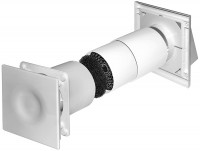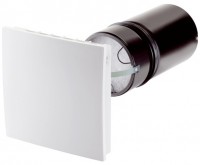Mitsubishi Electric Lossnay VL-50S2-E
 | Outdated Product System type: decentralized; Ventilation type: recuperator; Mounting: wall; Mounting diameter: 120; Max. noise level (dB): 37; Type of heat exchanger: plate; Heat exchanger material: cellulose; Power consumption in ventilation mode (W): 19; |
Mitsubishi Electric Lossnay VL-50S2-E | |||||||||||||||||||||||||||||||||||||||
| |||||||||||||||||||||||||||||||||||||||
Always clarify the specifications and configuration of the product with the online store manager before purchasing.
Catalog Mitsubishi Electric 2025 - new arrivals, bestsellers, and the most relevant models Mitsubishi Electric.
Modest and strict
The Mitsubishi Electric VL-50S2-E air handling unit with heat recovery function is designed for ventilation of rooms up to 15 – 20 m2, such as a kitchen, attic, nursery or bedroom. It only has two speeds. At the first, the productivity is 15 m³ / h. This intensity of air exchange is enough for a person to have a healthy sleep. In the daytime, when at least minimal activity is expected in the room, an increased speed should be turned on, ensuring the unit's productivity at the level of 51 m³/h. Turning on, off and switching speeds is carried out only with the help of a cord hanging from the unit body (this disadvantage is not found in the Mitsubishi Electric VL-50ES2-E ventilator, which differs only in the possibility of connecting an external switch). The design of the device allows various options for mounting on the wall (vertically or horizontally).
Details and nuances
The body of the device has the shape of a parallelepiped and a very discreet design, like modern air conditioners. Inside it are a centrifugal fan (the only moving part in the entire ventilator) and a heat exchanger. Its function is to recover heat. The heat exchanger is made of cellulose with special impregnation. This material absorbs moisture from the air that is “thrown” out, and then returns it to the air flow coming from outside. This improves the microclimate in the room and in most cases eliminates the need for a separate humidifier. There are no filters inside this heat exchanger, but a place is provided for them. Filters (fine or HEPA, depending on your needs) are purchased separately.
Japanese quality
Why is a heat exchanger so simple in design and configuration not the cheapest? Firstly, because it is made in Japan (most other home-grade units are made in China). Secondly, the cost is affected by the fact that Mitsubishi Electric installs only the highest quality components in its climate control equipment. For example, the fan of this unit has a very low power consumption (power consumption is only 19 W at high speed), high reliability and quiet operation even at maximum ventilation intensity.




